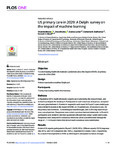US primary care in 2029: A Delphi survey on the impact of machine learning
| dc.contributor.author | Blease, C | |
| dc.contributor.author | Kharko, Anna | |
| dc.contributor.author | Locher, C | |
| dc.contributor.author | DesRoches, CM | |
| dc.contributor.author | Mandl, KD | |
| dc.date.accessioned | 2020-10-09T12:03:10Z | |
| dc.date.available | 2020-10-09T12:03:10Z | |
| dc.date.issued | 2020-10-08 | |
| dc.identifier.issn | 1932-6203 | |
| dc.identifier.issn | 1932-6203 | |
| dc.identifier.other | ARTN e0239947 | |
| dc.identifier.uri | http://hdl.handle.net/10026.1/16496 | |
| dc.description.abstract |
OBJECTIVE: To solicit leading health informaticians' predictions about the impact of AI/ML on primary care in the US in 2029. DESIGN: A three-round online modified Delphi poll. PARTICIPANTS: Twenty-nine leading health informaticians. METHODS: In September 2019, health informatics experts were selected by the research team, and invited to participate the Delphi poll. Participation in each round was anonymous, and panelists were given between 4-8 weeks to respond to each round. In Round 1 open-ended questions solicited forecasts on the impact of AI/ML on: (1) patient care, (2) access to care, (3) the primary care workforce, (4) technological breakthroughs, and (5) the long-future for primary care physicians. Responses were coded to produce itemized statements. In Round 2, participants were invited to rate their agreement with each item along 7-point Likert scales. Responses were analyzed for consensus which was set at a predetermined interquartile range of ≤ 1. In Round 3 items that did not reach consensus were redistributed. RESULTS: A total of 16 experts participated in Round 1 (16/29, 55%). Of these experts 13/16 (response rate, 81%), and 13/13 (response rate, 100%), responded to Rounds 2 and 3, respectively. As a result of developments in AI/ML by 2029 experts anticipated workplace changes including incursions into the disintermediation of physician expertise, and increased AI/ML training requirements for medical students. Informaticians also forecast that by 2029 AI/ML will increase diagnostic accuracy especially among those with limited access to experts, minorities and those with rare diseases. Expert panelists also predicted that AI/ML-tools would improve access to expert doctor knowledge. CONCLUSIONS: This study presents timely information on informaticians' consensus views about the impact of AI/ML on US primary care in 2029. Preparation for the near-future of primary care will require improved levels of digital health literacy among patients and physicians. | |
| dc.format.extent | e0239947-e0239947 | |
| dc.format.medium | Electronic-eCollection | |
| dc.language | en | |
| dc.language.iso | en | |
| dc.publisher | Public Library of Science (PLoS) | |
| dc.subject | Adult | |
| dc.subject | Female | |
| dc.subject | Forecasting | |
| dc.subject | Humans | |
| dc.subject | Machine Learning | |
| dc.subject | Male | |
| dc.subject | Medical Informatics | |
| dc.subject | Middle Aged | |
| dc.subject | Primary Health Care | |
| dc.subject | Surveys and Questionnaires | |
| dc.title | US primary care in 2029: A Delphi survey on the impact of machine learning | |
| dc.type | journal-article | |
| dc.type | Journal Article | |
| dc.type | Research Support, Non-U.S. Gov't | |
| plymouth.author-url | https://www.webofscience.com/api/gateway?GWVersion=2&SrcApp=PARTNER_APP&SrcAuth=LinksAMR&KeyUT=WOS:000581809800035&DestLinkType=FullRecord&DestApp=ALL_WOS&UsrCustomerID=11bb513d99f797142bcfeffcc58ea008 | |
| plymouth.issue | 10 | |
| plymouth.volume | 15 | |
| plymouth.publication-status | Published online | |
| plymouth.journal | PLOS ONE | |
| dc.identifier.doi | 10.1371/journal.pone.0239947 | |
| plymouth.organisational-group | /Plymouth | |
| plymouth.organisational-group | /Plymouth/Faculty of Health | |
| plymouth.organisational-group | /Plymouth/Users by role | |
| dc.publisher.place | United States | |
| dcterms.dateAccepted | 2020-09-16 | |
| dc.rights.embargodate | 2020-10-14 | |
| dc.identifier.eissn | 1932-6203 | |
| dc.rights.embargoperiod | Not known | |
| rioxxterms.versionofrecord | 10.1371/journal.pone.0239947 | |
| rioxxterms.licenseref.uri | http://www.rioxx.net/licenses/all-rights-reserved | |
| rioxxterms.licenseref.startdate | 2020-10-08 | |
| rioxxterms.type | Journal Article/Review |


